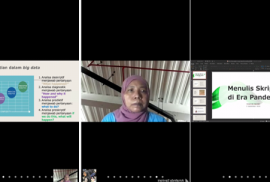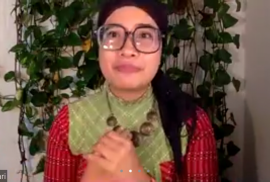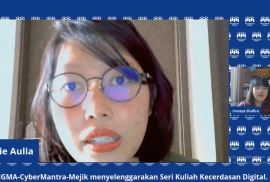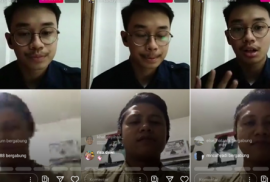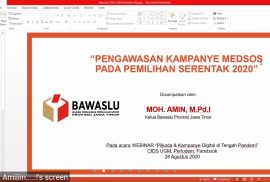The coronavirus pandemic has existed for a long time and it brought a lot of burden to several industries, including Indonesia’s film industry. The pandemic hugely affected the network of cinema who used to be the primary place to watch movies. On 23 March 2020, the local government of DKI Jakarta deactivated one of the biggest cinema companies in Indonesia, Cinema XXI, to support the semi-quarantine measures (Ardanareswari, 2020). At first, only two weeks of deactivation was planned. However, seeing that the situation has not been better, the deactivation is changed to an indefinite amount of time. The local government of DKI Jakarta cancelled the permit to open cinemas numerous times to prevent a more aggressive spread of the virus. In effect, the premier and promotion for several domestic movies are postponed. Several production processes are also halted for an indefinite time.
The spread of the Covid-19 pandemic in Indonesia triggers an array of problems in several sectors. In this case, some activities that used to be done offline have to adapt to an online system. The research sector is also disturbed by this pandemic since several field research can’t be conducted in order to minimize the physical interaction between the researcher and the respondent.
The pandemic and alternative research method
The health and security aspect becomes the utmost priority of each individual, including university students,in the middle of this pandemic. The limitation of space, difficulty to get out of their home, and the strict health rules are factors that contribute to the failure of last year university students to complete their final essay. Generally, this pandemic makes it difficult for final year students to conduct field research or qualitative research that requires them to physically be in the field to observe. Meanwhile, the average research method used by bachelor students, especially in the politics and government department, is the qualitative field research with a primary data source (Savirani, 2020).
Yogyakarta, 5 September 2020—In commemoration of International Literacy Day, DiskusHI #4 picked the topic of literacy activism performed by IR UGM alumni, its relevance with international relations, and the urgency of literacy (particularly in the midst of the pandemic). Titled“From International Relations to Literacy”, the event invited Okky Madasari—IR UGM alumna batch 2002 who is currently working as a writer —and Deddy Permadi – IR UGM alumnus batch 2004 who acted as the head of SIBERKREASI ’17 and is currently a special staff for the Minister of Communication and Information — to speak on the matter. The discussion was aired live through Zoom and moderated by Nenda Primonik Rengganis—an IR UGM alumna batch 2008—CEO and founder of Hipwee.
Yogyakarta, September 3rd 2020—“Cover letter is one of the requirements that is needed to apply for a job. Therefore, a cover letter should be interesting to succeed in the recruitment process. “At least 49% of HR managers consider a cover letter to be the second best thing that can boost an applicant’s resume,” said Stephanie Wijanarko, Program Director of VOOYA, in her introduction of the material in the webinar Powerful Cover Letter: Heroes vs Villains Archetype Storytelling Technique.
Yogyakarta, September 3rd 2020—The Digital Intelligence Class Series, which is the newest course at the Faculty of Social and Political Sciences, presented a webinar entitled “UX Writer: New Job Options in The Digital Industry” on the last Thursday (3/9) together with Rizqie ‘Keke’ Aulia, as the UX Writer Halodoc, that shared her experiences on YouTube Live.
Familiarly called ‘Keke’, this alumna of the Department of International Relations of FISIPOL UGM class 2011, shared her experiences of being a UX Writer, a new profession which is still strange for many people. “UX Writer profession developed in 2015 or 2016. Back then, there was no need to become a UX Writer, because the digital world is developing, there will be more diverse jobs in the future,” Keke said as the opening of discussion.
Yogyakarta, 31 Agustus 2020—#BRIWORKMikirBareng Fisipol UGM is back with a discussion about one of the current topics ever since quarantine is implemented which is business in the middle of the pandemic. This discussion series that was held for one hour invited Andy Sugiarto (Team Leader of Indonesia Mall) and Sulistyorini or Orin (An owner of a low caffeine coffee brand, Kopinata) as the speakers. The difficulties faced during the pandemic is not an excuse to not be productive. The condition that forced humans and other sectors of life to adapt also pushes new responses to the status quo. One of them comes from the business sector which needs to be quick in adapting to the demands of the market.
Yogyakarta, 30 August 2020—Korps Mahasiswa Politik Pemerintahan/KOMAP Fisipol UGM has successfully organized an alumni sharing session as its fifth event in Bincang KOMAP series themed “From Sansiro to Istana”. Aris Setiawan Yodi, S. IP, a Politics and Government Studies student batch 2012 who is currently working as an assistant coordinator for the Presidential Special Staff, was present as the speaker. The session was aired via Instagram live, led by Prayuda as the moderator.
“Prior to working for the Presidential Staff Office, I started out my career in the Department of Politics and Government Studies for a year. Later on, I moved to Jakarta and worked as a journalist for Kompas. I was lucky to have the chance to work in the Office,” Aris told the audience after introducing himself. Aris added that he had dreamed of working in the political field since he was in high school. He reckoned that the world of politics provided him with a chance to contribute to the nation. “For freshmen who are currently watching, you are in the right place to contribute to the country. Do not regret studying in the Department; be grateful for this privilege.”
Yogyakarta, August 28th 2020—Towards the implementation of social entrepreneurship class batch 2, Fisipol Creative Hub and PIKA UGM (Pusat Inovasi dan Kajian Akademik/Center for Academic Innovation and Studies) collaborated with Lokalate brand, held a virtual class with the tagline #SobatMelekGue. This virtual class is held in four series of classes which began on August 24, 2020. In this second session, Brand Strategy in New Normal became the topic that was discussed in an interesting way by Jesaya Christian as the Brand manager of L-Men Lokalate Nutrifood.
Yogyakarta, August 28th 2020—Center for Digital Society UGM cooperated with Association for Elections and Democracy (Perkumpulan untuk Pemilu dan Demokrasi/Perludem) and Facebook Indonesia held an online webinar. It was called ‘Regional Head Elections and Digital Campaign in the Middle of a Pandemic’, this webinar presented four speakers from various expertises, from the organizer itself—Facebook Indonesia and Perludem—, to General Elections Commission of Republic of Indonesia (KPU RI) and Election Supervisory Agency (Bawaslu). The representation of CfDS—Faiz Rahman, Adjunct Researcher of CfDS—also joined in this discussion and was moderated this discussion.
Yogyakarta, August 28th 2020—The ongoing pandemic, which houses not only workers, but also students, has also made many adjustments that have been made quickly by the University and Faculty to continue serving teaching and learning needs. One of them is the need for access to borrow books from the campus library. Answering this problem, the UGM Library held a small talk session on the Menyapa Library channel (Instagram: @perpustkaan_ugm) which used the Instagram Live feature. In this session, the Menyapa Library was held for the 10th time with the main topic being related to the library services of the Faculty of Social and Political Sciences and Faculty of Law in the new normal era. Each faculty was represented by Sunarno, S.IP., M.A. (Faculty of Law) and Yuli Hesti, S.IP. (Faculty of Social and Political Sciences).


